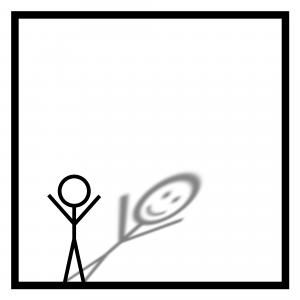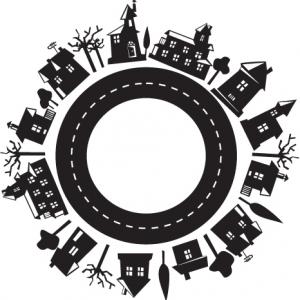
Joe Kay is the associate minister at Nexus United Church of Christ, Butler County, Ohio. He also writes a weekly blog at https://joekay617.wordpress.com. His email address is listed on the blog, in case you care to contact him directly.
Posts By This Author
Grace Bats Last
A bunch of us writers were in Florida covering spring training a few years ago. Our sports editor took us out to dinner. During the conversation, she asked if we ever found ourselves pulling for a favorite player to do well — say, in the ninth inning of a dramatic comeback.
The response was unequivocal and unanimous. No! Never! Not in the ninth inning!
By the bottom of the ninth, the story is written. Ready to be sent out as soon as the game ends. A lot of hard work has gone into those sentences. The home team had eight entire innings to take the lead. Sorry. They had their chances. Now they should just lose quietly. Don’t mess up my story!
For the most part, sports writers hate dramatic comebacks. You have to hit the “delete” key on a lot of hard work. And then you frantically rewrite on deadline, which is the toughest type of writing.
Some time later, though — and this may not come until you’re driving home at 3 a.m. — you let your brain throttle back from hyper drive and say: Wow, that was pretty cool. Even though it drove my typing fingers crazy.
One of the best things about sports is that there’s always a chance for something grand at the end. Something that can take your prose away — and your breath away — in one unexpected moment.
Maybe that’s why fans — OK, and yeah, even sports writers — revel in those incredible finishes. They remind us of the sweetly unpredictable nature of our lives. And how in each of our lives, as Anne Lamott puts it: “Grace bats last.”
It’s true.
I’ve seen that ninth-inning comeback play out many times.
Subversive Little Crumbs
I stood at the bread shelf in the neighborhood grocery store, trying to decide which loaf I should buy. Tough decision. I looked at all the types of bread and went back and forth many times.
Which one would be best for communion? I didn’t know. I’d never had to make this choice.
Our pastor was at a conference for the weekend. As the associate minister, I would be presiding over the Sunday service for the first time. Before he left, we went over the details of all that had to be prepared.
He reminded me that I needed to buy the bread for communion.
Uh, I hadn’t thought about that. Where do you get it?
“The grocery store will do just fine.”
So there I was, looking over the loaves, wondering which one looked the most, well, communion-y. Maybe that pretty, round Tuscan loaf. Wait, maybe the nice Jewish rye over there. My wry sense of humor kicked in. Jesus would smile over that, right? Being Jewish and all.
No, better not …
I finally picked an Italian loaf — mainly because it was big and it looked pretty and it was on sale. I put it in my basket and headed for the self-checkout line.
When I scanned the loaf, the automated voice asked: “Do you have any coupons?” No, no communion coupons. Not today.
I swiped my credit card and was reminded that my purchase would earn me a few cents off my next gasoline purchase. How’s that for transubstantiation — bread transformed into bonus points?
A Beloved Guest at Inn-Sanity
I’ve become a big fan of author Anne Lamott. How can you not love someone who says her thoughts about others are sometimes so awful "they would make Jesus "want to drink gin straight out of the cat dish?”
And when she screws something up — which would be often, of course — she has a “Bad Mind” that starts telling her she’s such a loser. Always has been, always will be.
I know that voice. A couple of weeks ago, we talked about that voice at church. Our reading was the story about Jesus getting baptized in a muddy river and how he heard a distinct and unmistakable voice talking to him as he stood there dripping. The voice called him beloved. Reassured him that he was loved, deeply and passionately. In our discussion after the reflection, I mentioned Anne’s "Bad Mind" and how it’s often my mind too, screaming to be heard and believed. Our pastor — who also likes Anne — asked if anyone else hears that Bad Mind voice. Everyone raised their hand. Nodded, too.
Yep. We all seem to be on a first-name basis with that voice. At least I’m not the only one.
Your Story Stinks … Oh, and Peace on Earth
The letter arrived at work about two weeks after baseball’s opening day in 2003. It had a Zanesville, Ohio, postmark. A return address sticker mentioned a Mrs. Howard Richardson.
What‘s this about?
Inside was a handwritten note along with a neatly clipped copy of my Cincinnati Reds season preview story from the Zanesville Times Recorder. I didn’t have to read far to get the gist.
This Mrs. Howard Richardson — she wasn’t happy with me. Not at all.
In beautiful cursive — the kind of handwriting you don’t see anymore — she pointedly took me to task for suggesting the Reds could be awful that season. I should be more positive, she insisted. It would help the players.
“You get more flies with honey than vinegar!!!!!” she wrote. (Yes, underlined and topped off with many exclamation points.)
The note was signed: Evelyn Richardson.
Why Are Manger Scenes So Weird?
Figures in nativity scenes are pretty weird, aren't they? This is true of most manger scenes, whether we’re talking about the ceramic one under a tree or the statuesque one in a church or the plastic one on a lawn. First off, there’s Mary, always looking very fresh and calm and full of reflection — which is quite impressive considering that she just gave birth without any sedative. Then there’s Joseph, doing some kind of man-thing off to the side — holding a lantern or a large stick. He looks totally composed, too.
And there’s the baby Jesus with a full head of hair, wide-open eyes and arms outstretched like he’s ready to belt out a song.
Not to ruin anyone’s Christmas spirit here, but what the heck?
If our manger scenes were realistic, Mary would be recovering from a painful labor full of sweat and blood, with a look on her face that’s anything but serene. And Joseph — wouldn’t he be a nervous wreck, too? His hand too shaky to hold a lantern?
And about that newborn. Shouldn’t he be red-faced and screaming? Eyes clenched closed and wisps of hair stuck to the top of a head that‘s still odd-shaped from all the squeezing?
Instead, we’ve sanitized and romanticized it. We’ve removed all the blood and sweat and tears and pain and goo. It’s no longer something real. We’ve left out all the messy parts. The oh-my-God-what-now parts. The I’m-screaming-as-loud-as-I-can-because-it-really-hurts parts. The oh-no-I’ve-stepped-in-the-animal-droppings parts.
The real parts.
Are We Ready to Listen?
The three of us put our cups of coffee on the counter and reached into our pockets for our wallets. The check-out clerk paid no attention to any of us. He seemed to be staring at someone or something in the back of the store.
“We’re ready to pay,” one of us said.
The clerk kept looking at the back of the store. A few seconds went by before he told us what had his attention.
“I’m watching that boy over there to make sure he don’t steal nothing,” the clerk said.
The three of us looked at the back of the store and realized the clerk was talking about our co-worker.
Four of us were carpooling across Florida on a work assignment several years ago. It took several hours to cross the state. We stopped at a place called Yeehaw Junction off Route 60 to use the restroom and get some coffee.
The three of us at the check-out counter were white, like the clerk. The co-worker accompanying us was black. The clerk assumed that because the three of us were white, we would understand and agree with his attitudes and assumptions about our co-worker – that he was dishonest because of the color of his skin. Needed to be watched. Couldn’t be trusted. Too dangerous to let out of his sight.
Waiting for Heaven
But wait! What if we‘ve got it backward? To revisit that waiting-goes-both-ways thing: Instead of us waiting on God, what if God is waiting on us?
John Dominic Crossan poses that question in his book The Power of Parable. He notes something that’s obvious: Jesus could be very impatient. He wasn’t one to just sit back and wait for things to change. As Crossan sums it up: “You have been waiting for God, he said, while God has been waiting for you. No wonder nothing is happening. You want God’s intervention, he said, while God wants your collaboration. God‘s kingdom is here, but only insofar as you accept it, enter it, live it, and thereby establish it.”
There’s so much to be done — what’s important is to do it now. This moment is a gift. This opportunity to love someone else is too precious to waste.
If all we do is sit and wait for things to change, then we’re like people trapped in a perpetual state of Advent. We never get to our own Christmas morning. We do nothing more than wait.
And all the while, someone is waiting on us.
A Homeless Man and A Candy Cane
James was playing cards with several other nursing home residents in a room that doubles as their dining area. The “stakes” for their game was a stash of candy from a Christmas party earlier in the day. He saw me and waved me over. James grabbed one of the candy canes in his pile and offered it with his right hand, the one that had L-O-V-E spelled out on the backs of his four fingers with a self-applied tattoo.
“Would you like some candy?” he said.
James was short, thin, in his 40s. His most distinctive features were those homemade tattoos on his fingers, hands and forearms. And the outline of a metal plate protruding from his lower right leg.
An auto accident left the leg mangled. He didn’t have medical insurance to cover the enormous hospital bills. He couldn’t stand on the leg as it healed, so he lost his job as a cook. And soon, his apartment. He was living on the streets, sharing needles and drugs to deaden the pain in his leg. He wound up sharing someone’s AIDS as well.
But that’s not why he was dying. He’d developed cancer. There was nothing they could do.
I got to know James as part of my work as a hospice volunteer. He only slowly warmed to me — all that time on the streets made him wary of people and their motives. He didn‘t trust very much.
But now he was offering me a candy cane.
When You're Stuck Behind a Student Driver
While driving to work the other day, I wound up stopped behind this car with a sign taped to the back window that said: “STUDENT DRIVER / PLEASE BE PATIENT / THANK YOU.”
It made me smile.
I remember being a 16-year-old behind the wheel of our family’s red station wagon, learning to drive with one of those handmade signs taped to the back window. I remember my dad sitting in the passenger seat and being very, very quiet the first time I merged onto an interstate with the semis whizzing past.
Maybe that’s why when I see a car with a student driver, I don’t get upset if they take forever to decide it’s finally safe to make that left-hand turn. Or if they’re entering the highway at 35 mph and I have to slow down and accommodate them.
Been there, remember that.
What in the Name of God Is Going On?
A friend mentioned that he likes my blogs dealing with love and compassion and other themes without getting into religion specifically. He said that the mention of God can make things uncomfortable.
My reaction: I know exactly where he’s coming from.
The word “God” has become such a loaded term. We’ve made it that way; God hasn’t done it. And the truth is, I’ve found myself shying away from using the word at times because I’m aware it’s an immediate turnoff to some people. They have the same sort of visceral reaction that we get when we see one of those political attack ads come onto our TV set.
We want to reach for the remote and change the channel.
One of the reasons I started writing blogs was to try to strip away some of the nonsense we’ve attached to the name. And there is so much nonsense. You know what I mean:
That God loves me more than you. God approves of me and those who are like me, but not you and those who are like you. God likes my religion and my way of life, but not yours. God is on my side in any disagreement. God approves of hatred and judgment and killing. God promotes crusades and inquisitions and holy wars.
So much …
Chemo Drips and Left-Handed Layups
One of my days last week started with my usual wake-up routine — sitting in a chair, sipping my first cup of coffee, checking up on Facebook posts — when one of them made me smile.
A long-time friend in Cleveland has endured 250 days of chemotherapy and radiation. He’d just received the results of his latest scan: No trace of cancer anywhere. Yes! Chuck noted that “the collateral damage has been great” from all the chemicals and radiation. He now stumbles around and has trouble typing, both temporary conditions. But he’s cancer-free.
Stumbling, yet still standing.
Still Looking for a Costume?
I was browsing an elaborate Halloween store and came across an aisle of religious-oriented costumes. There were the usual ones: nun, rabbi, priest. And one I’d never seen before.
Yes, you can go Trick-or-Treating as Jesus this year. There is a Jesus costume.
What do you think about that?
I’m guessing some people will feel offended; I understand and respect where they’re coming from. Others would see it as harmless and find some humor in it. (Hey, see the guy in the Jesus costume? He gave treats to the whole neighborhood using only two Swedish Fish.)
I had a feeling there was material for a blog in all of this somewhere, so I took a photo, filed the idea in the back of my brain, and moved on to inspect the rubber rats and flying bats that are more my style.
Eventually, a thought worked its way into the front of my brain:
Why shouldn’t someone wear a Jesus costume?
In Need of a Blessing
Henri Nouwen was a priest who taught at Harvard, Yale, and Notre Dame. He also was a talented and popular writer. Over time, he became dissatisfied in his role as a professor. He got an unexpected invitation to become chaplain for a community of people with intellectual disabilities in Toronto. He accepted and soon had misgivings.
Henri quickly realized that the people under his care couldn’t care less about what he’d written or how much he‘d learned. They weren’t capable of reading and understanding his beautiful words.
Henri was going to have to change. He would have to start living those words in a deeper way. And that’s hard. (I know full well that it’s much easier to write about things in a flowing way than it is to let those words flow through me in how I live every day.)
He had an experience that drove home the point.
In his book Life of the Beloved, Henri tells of a woman named Janet who lived in the community and was having a difficult time. So she asked Henri for a blessing. He responded in a rote way, putting his thumb to her forehead to make a sign of the cross — something he’d done countless times in his role as a priest.
Janet would have none of it.
“No, that doesn’t work,” she protested. “I want a real blessing!”
How to Keep Moving
I had a birthday over the weekend, and I was reminded of a funeral joke. (OK, so this is a little weird, but hang with me for a moment.) Here’s the joke:
Three older guys are talking about what they would like the minister to say at their funerals.
“Well,“ says the first man, “I hope the minister stands in front of my casket and tells everyone that I was a good man who loved his family.”
The second man says: “I hope the minister stands in front of my casket and tells everyone that I tried to inspire others with my life.”
The third man thinks for a moment.
“I hope the minister stands in front of my casket and says, ‘Wait, look! He’s still moving!’”
Yeah, bad joke. But it touches on something important nonetheless.
We need to keep moving.
And That Is Grace ...
It’s interesting how the word “grace” gets used a lot, even by those who don’t necessarily consider themselves religious. It’s a favorite name for a character that represents someone who is a gift to us — I’m thinking about Bruce’s girlfriend Grace in Bruce Almighty, or Eli’s reassuring encounter with a woman named Grace in the second season of the TV series Eli Stone.
You can probably cite many more examples of characters named Grace in different movies, television shows, and books.
We like to put flesh-and-blood on the notion that we are recipients of some great gift that arrives unexpectedly and is given freely. Someone or something that comes into our life and significantly changes it for the better in some ways.
But what is grace? Who is grace to us?
A Funeral, a Stick Figure, and Joy
The television show Castle involves a mystery writer (Richard Castle) who helps a New York City homicide detective (Kate Beckett) solve tough cases. Beckett decided to become a police officer after her mother, a community activist, was murdered and the case was never solved.
In one episode, Castle notices that Beckett keeps a stick figure in the top drawer of her desk at the precinct. It’s odd-looking. The sticks that form the limbs don’t match exactly. The head looks like one of those football-shaped coin purses. It’s all held together by what appears to be seaweed and twine.
Castle wants to know the story behind it.
Beckett tells how on the day of her mother’s funeral, she was really sad so her father took her to Coney Island, one of her favorite places. They walked along the beach in their funeral clothes for a long time. It became a special time for the two of them.
At one point, they decided to gather items that had washed up on the beach and they made the stick figure.
So, why does she keep it in her drawer?
“He’s a reminder,“ Beckett says, “that even on the worst days, there is a possibility for joy.“
Stopped Cold By A Pepsi Can
Let me tell you about the time I got re-directed by a Pepsi can.
It happened a few years ago. I’d started rethinking a lot of things about my life — what I wanted to accomplish with it, how God played into all of it — and decided to write my thoughts as I went along.
Eventually I got the idea that I could package my writing into a book that might help others who are going through the same things. Writers fantasize about some day having a best-seller; maybe this would be mine. I wrote and wrote and wrote and stepped back one day and read all of it and realized something.
It was awful.
I’m not so good at this type of writing. Expressing thoughts and feelings is a lot harder than reporting on events. Words are so inadequate. It’s so easy to cross the line between being helpful and being insufferable. At times, I sounded like a pompous ass.
So, what to do?
I went back and rewrote. And rewrote again. I decided to try to make it breezier and more conversational — that’ll do the trick. I read it again and realized that I now sounded like a breezy, pompous ass.
It’s called writer’s block, and it felt like a dead end. Maybe I should wait a few years and try again then. Hit define and delete, give up the struggle and move on. That seemed like the best thing to do. Stop trying to create for now.
I went jogging to mull it over.
It was a beautiful autumn evening with a wonderful, warm breeze out of the south. I’d just finished my jog and was walking around the block to cool down, enjoying the wind on my sweaty face, when a sound got my attention.
Religion, in the Right Hands
I was privileged to attend the ordination of a friend recently. For the first time, Michelle got to say the blessing over the bread, to break the bread and to give it to all of us with her hands.
Many tears, much joy.
As she handed me a small piece of the bigger loaf, I was reminded of how we, like the communion bread, are in the hands of others for so much of our lives. And how religion can be a thing of so much good or so much pain, depending upon whose hands it is in.
In the right hands, it’s a pathway to the divine. In the wrong hands …
It’s important that we always differentiate between religion and God. The two are distinct. God is always much bigger than any and all of our religions.
Being a Neighbor
Let me tell you about Steve the neighbor.
When my sister and her family moved some years ago, they quickly learned that they had a lot of retired people as neighbors. Steve lives next door, a former postman who had to retire because of a balky hip. Big and strong, a little rough with the language — all part of his charm.
Steve and two retired buddies on the street spend a lot of time together, grilling together, helping each other through the many challenges that come with getting older. And if anybody needs assistance with anything, they are there to help.
They often say: “We’re neighbors. It’s what we do.“
Steve knows when my sister’s children get home from school, so on snowy days, he’ll rev up the plow and clear her sidewalk and driveway so they can get through without getting stuck. He does it without prompting. Anything else I can help with? The garage door is shimmering? There’s a shrub that needs to be dug up? Be right there with my buddies.
You know those people who make you feel better just because you’re around them? How their upbeat attitude rubs off on you? You leave them with a smile on your face? That’s him.
As my brother-in-law puts it, Steve is a perfect neighbor. Concerned, but not nosy. Willing to help, but never pushy. No payment is accepted. The feeling that they’ve helped someone is thanks enough.
They’re neighbors. It’s what they do.
Hidden Pictures
As a child, I thought the only good part of going to the doctor’s office was getting to read the "Highlights" magazine in the waiting room. The "Hidden Pictures" page was my favorite. You‘ve probably seen it. There’s an intricate line drawing that has small pictures cleverly embedded within the big picture. The challenge is to find them. There’s a list of the hidden pictures, and you search to find the comb that’s blended into the girl’s bangs, the carrot concealed in plain sight as part of a spoke in a wheel.



















